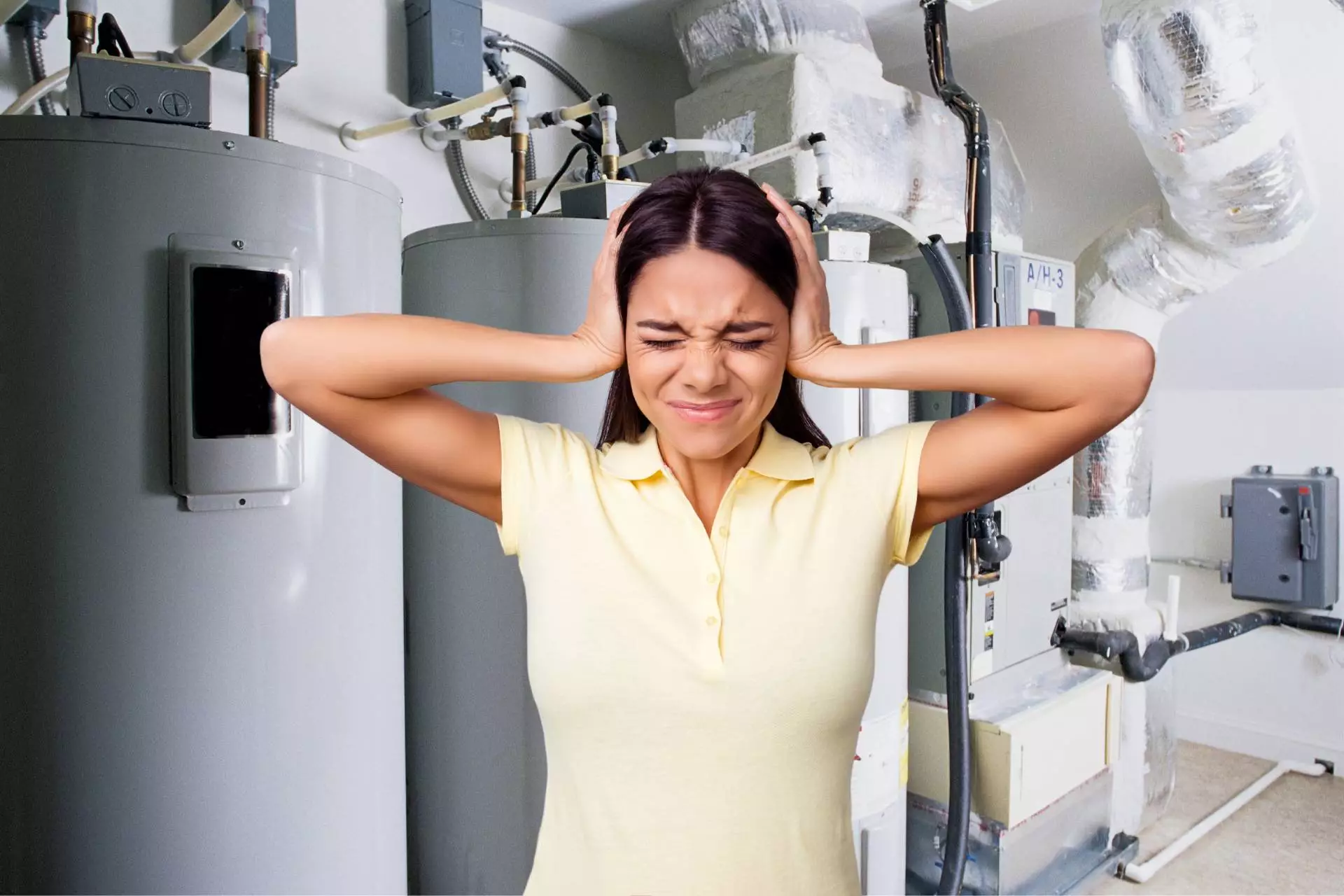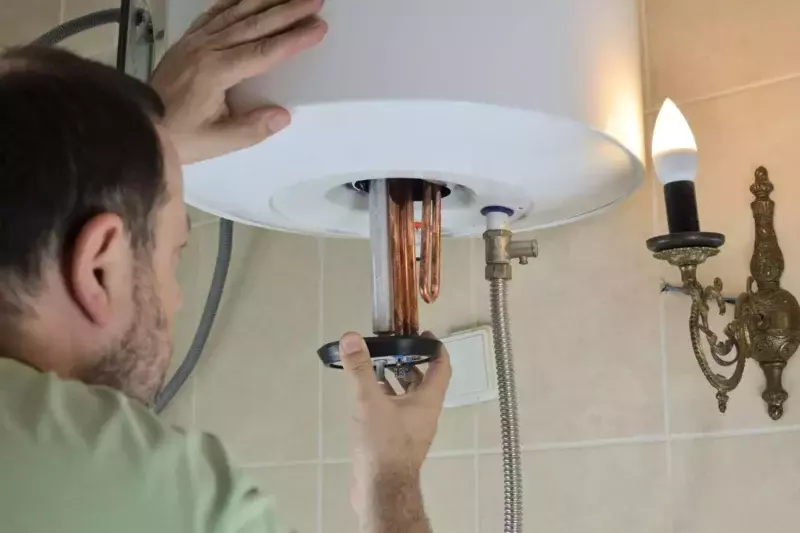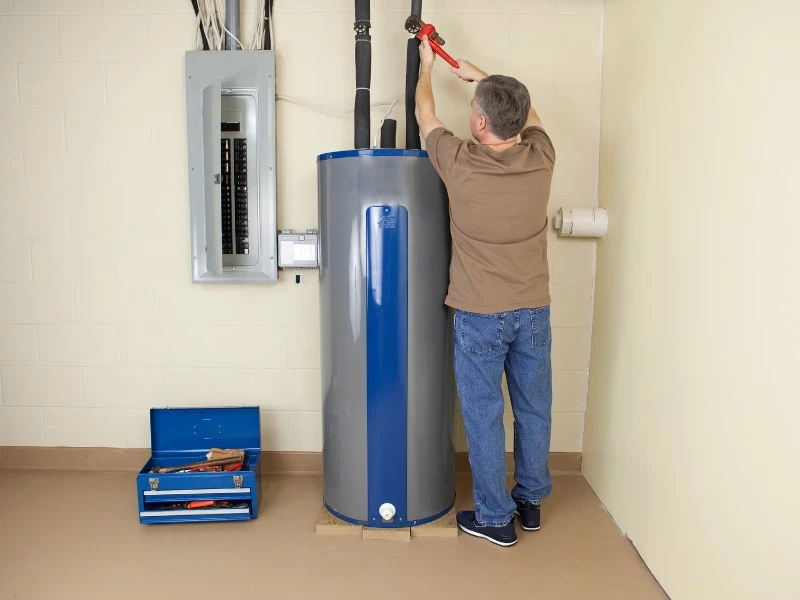[ad_1]
? Why Is My Hot Water Heater Making Noise When Water Is Off?
Hot water heaters are essential to modern living, providing us with hot water for bathing, cleaning, and cooking.
However, when they start making noises, it can be frustrating and concerning.
If you’re hearing strange sounds coming from your hot water heater even when the water is turned off, it’s important to understand why and what you can do to fix it.
This article will break down the common water heater noises, troubleshooting techniques to fix the problem, and preventative maintenance tips to prevent it from happening again in the future.
? Understanding Hot Water Heater Noises

Water heaters are an essential part of any home, providing hot water for showers, washing dishes, and doing laundry.
However, they can also make a variety of sounds that can be concerning for homeowners.
These sounds can range from popping and cracking to humming noises and hissing, and they can indicate a range of problems with your water heater.
One of the most common hot water noises is a loud popping or cracking sound that can range from soft to explosive.
This noise is often caused by overheating water that expands and bubbles violently, creating steam and pockets of air within the tank.
While this noise can be alarming, it is usually not a cause for concern and can be easily fixed by adjusting the temperature on your water heater.
Related Reading: What Temperature Should A Hot Water Heater Be Set At?
Another common noise is a high-pitched whistling or hissing sound, which is often a result of a valve opening due to excess pressure in the water tank.
This noise can be more concerning, as it can indicate a problem with the pressure relief valve or the pressure regulator.
If you hear this noise, it is important to contact a professional plumber to diagnose and fix the issue.
? Causes of Noises in Water Heaters
Many factors can cause water heaters to make noises, ranging from benign to severe.
One of the most common causes of water heater noises is sediment buildup in the water tank.
Over time, minerals and other debris can accumulate in the tank, creating a layer of sediment from mineral deposits that can cause popping, cracking, and other noises.
Flushing your water heater regularly can help prevent sediment buildup and keep your heater running smoothly.
Loose pipes or fittings can also cause water heater noises, as can water hammer.
A water hammer is a banging or thudding noise that can occur when water is turned on or off quickly, causing the pipes to vibrate and shake.
This noise can be particularly loud and can even cause damage to your pipes if left unchecked.
Expanding and contracting pipes can also cause water heater noises, especially if the pipes are not properly secured.
This can cause creaking, groaning, or other sounds as the pipes shift and move with changes in temperature.
Malfunctioning heating elements can also cause noises, especially if they are not heating the water evenly.
This can cause popping or cracking sounds, as well as other noises as the water heats unevenly.
Finally, excess pressure in the water tank can cause water heater noises, including whistling, hissing, or popping sounds.
This can be caused by a malfunctioning pressure relief valve or pressure regulator, and should be addressed by a professional plumber as soon as possible.
To recap, water heater noises can be concerning for homeowners, but they can also be easily diagnosed and fixed with the help of a plumber.
By understanding the common causes of water heater noises, you can take steps to prevent them from occurring and keep your water heater running smoothly for years to come.
? Troubleshooting Noisy Water Heaters

If you have a water heater making noise and you want to troubleshoot the problem yourself, there are several steps you can take.
These include:
? Inspecting the Heating Elements
If your water heater is making a popping or crackling sound, it’s likely due to sediment buildup on the heating elements.
Over time, minerals and other debris can accumulate on the heating elements, causing them to overheat and make noise.
To fix this, you’ll need to drain the tank and clean the elements thoroughly with a wire brush. This will help to remove any buildup and restore the heating elements to their normal functioning.
? Checking for Sediment Buildup
Sediment buildup is a common cause of heater noises, particularly a popping sound.
When sediment accumulates at the bottom of the tank, it can cause the water to boil and create pockets of air that make a popping sound.
To remedy the problem, you’ll need to drain and flush the tank to remove the sediment.
This can be done by turning off the power or gas supply to the heater, attaching a hose to the drain valve, and opening the valve to allow the water to flow out.
Once the tank is empty, you can refill it and turn the power or gas supply back on.
? Examining the Pressure Relief Valve
If you’re hearing a hissing or whistling noise from your water heater, it could be the pressure relief valve.
This valve is designed to release excess pressure from the tank to prevent it from bursting.
However, if the valve is faulty or stuck open, it can cause a constant hissing or whistling noise.
Check the valve to ensure it’s not faulty or stuck open, allowing excess pressure to escape. If it is, you may need to replace the valve to fix the problem.
? Assessing the Expansion Tank
If your water heater is making a banging or knocking sound, it may be due to the expansion tank.
This tank is designed to absorb excess water pressure from the water heater and prevent it from damaging the pipes or fixtures in your home.
However, if the tank is not properly installed or functioning correctly, it can cause a banging or knocking sound.
Ensure that it’s properly installed and functioning correctly by checking the pressure gauge and adjusting it if necessary.
By following these troubleshooting steps, you can identify and fix the source of your water heater’s noise.
However, if you’re not comfortable working on your heater yourself, it’s always best to call in a professional to ensure the job is done safely and correctly.
? Preventative Maintenance for Water Heaters

In addition to troubleshooting, it’s crucial to take preventative measures to ensure your water heater functions efficiently and quietly.
These measures include:
? Regularly Flushing the Tank
Flushing your water heater’s tank regularly can prevent sediment buildup, one of the most common causes of water heater noise.
Depending on your usage, this should be done every six to twelve months.
? Insulating the Pipes
You can also reduce the risk of water hammer, a knocking or popping noise often caused by expanding and contracting pipes, by insulating your hot water pipes.
? Installing a Water Hammer Arrestor
Installing a water hammer arrestor is essential to prevent pressure surges and protect your plumbing system from potential damage caused by sudden stoppages of water flow.
? Adjusting the Temperature
Lowering your water heater’s temperature can prevent overheating and bubbling that causes popping noises.
? Scheduling Annual Inspections
Regular inspection and maintenance of your water heater can detect potential problems early, preventing significant issues down the line.
? When to Call a Professional

If you’ve tried troubleshooting and preventative maintenance measures and your water heater is still making persistent noises or exhibiting signs of failure, it’s time to call in a professional.
Warning signs that indicate the need for a professional include:
- Leaking water heater
- No hot water or insufficient hot water
- Irregular functioning of the heating elements
- An expired warranty
❌ Persistent Noises After Troubleshooting
If you’ve tried to troubleshoot your water heater and the noises persist, it’s best to seek professional help.
Persistent noises can indicate more significant problems, such as a faulty thermostat or heating element.
❌ Signs of a Failing Water Heater
If your water heater is nearing the end of its lifespan, you may notice signs of failure, such as:
- Age (10-15 years old)
- Rust or corrosion around the tank
- Leaks
- Unusual noises
❌ Safety Concerns and Potential Hazards
It’s crucial to note that working with water heaters can be dangerous due to the high temperature of the water and the presence of gas and electricity.
Always turn off the power and shut off the gas supply before performing any maintenance or troubleshooting.
Additionally, be aware of gas leaks or carbon monoxide poisoning, both of which can be lethal.
? If you suspect a gas leak, evacuate your home immediately and call your gas company.
? Final Thoughts on Your Water Heater Making Noise

Weird noises from your water heater can be alarming but are often solvable through simple troubleshooting techniques and preventative maintenance measures.
Understanding the causes and taking action to fix them can ensure a long-lasting, efficient, and quiet hot water heater.
If you’d like to expand your knowledge about your home’s plumbing systems, feel free to explore our other articles in our plumbing blog.
Related Reading: DIY Guide to 15 Common Plumbing Problems & Solutions
[ad_2]
Source_link


